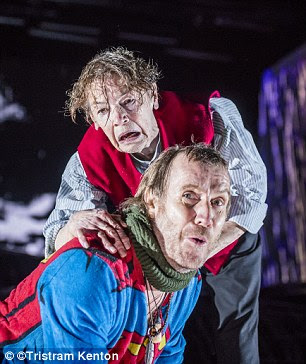Van Kampen has been the Director of Music at the Globe since 1997 and has composed the scores for over 50 productions there. Mr. van Kampen is none other than Mark Rylance and they have worked together constantly, so it is no surprise that he is here cast as Iago, but any thoughts of obviousness are forgotten as he is wonderful in the role, Iago is the motor for the whole play and Rylance here is firing on all cylinders.
His Iago is all the better for being older than I have usually seen played: it makes his anger at Othello promoting the younger Cassio over him more understandable and, played by Rylance as a jovial 'uncle' of the battalion, makes it more understandable that all the characters would confide in him. The production is taken at a fast pace so Rylance's quick emotional changes between concerned friend to conniving instigator are all the more exciting. His performance was also full of delightful touches: his increasing insistence that Roderigo bring money when he follows Othello to Cyprus signposts the poor sap is going to be rinsed by Iago, and starting off the lie to Othello about Cassio and Desdemona in such a teasing yet apologetic way.
Although not matching Rylance, André Holland's Othello was very well performed, slowly and inexorably drawn into the quicksand of jealousy and doubt. While not quite reaching the tragic heights of Othello's final moments it was still a fine portrayal which had solid roots in his first scene, where he established that Othello was by far the most worthy of husbands for Desdemona, his retelling of their courtship was very nicely played so the impression was of a performance that was thought-through from before he even set foot on stage. He also speaks the verse excellently in his American accent.
He was well-matched with Jessica Warbeck's Desdemona; it is a bugger of a role and I have seen previous Desdemona's slip into insipidness by just over-doing the wide-eyed innocent but Warbeck reined this in and gave a good performance of a woman torn between love and bewilderment. She was particularly affecting in her bedroom scene, singing the "Willow Song" while haunted by foreboding.
The three principles were surrounded by fine supporting performances: the always dependable William Chubb made an impression as Desdemona's distraught father Brabantio (a role he also played at the NT in Hytner's under-whelming production in 2013), Aaron Pierre's virile Cassio and Steffan Donnelly's duped Roderigo, for once not played as a silly-ass clown but as a young fish-out-of-his-depths.
Van Kampen's production also made me think of how the women all end badly: Desdemona and Emelia dead and Bianca - nicely played by Catherine Bailey - arrested for Cassio's attack. Sheila Atim's Emelia, the cynical wife of Iago who is Desdemona's attendant - was nearly done in by the costume designer's frocks: two pants-suits which were distracting for all the wrong reasons, particularly her first-act gold crushed velvet number which even Prince would have turned his nose up at. However she gave a full-on fiery performance, particularly in her final speech which in these MeToo times rang clear:
"Let heaven and men and devils, let them all,
All, all, cry shame against me, yet I'll speak.
Is Othello my favourite Shakespeare play? It's certainly up there, thanks to no 'rude mechanicals' cluttering up the play with sub-plot, it's masterly construction and it's characters that come so vibrantly to life - and death - when played well. Psychologically astute and emotionally wrenching, it is somehow wonderfully fitting that after the carnage that he is responsible for has happened, Iago - who until then has never stopped talking to the audience making us unwilling accomplices in his plot - says nothing. He doesn't need to, the fun was in the plotting... he had no endgame, just revenge...
Demand me nothing: what you know, you know:
From this time forth I never will speak word.
It is somehow fitting that OTHELLO should play the Globe as it's creator, actor Sam Wanamaker played Iago opposite Paul Robeson's Othello in 1959 at Stratford-upon-Avon in a production directed by Tony Richardson.
It is a pleasure to be able to recommend productions at The Globe again and although OTHELLO is sold out until the end of it's run on October 13th, there is always the chance of returns sold 90 minutes before the show's 7.30pm start.



























